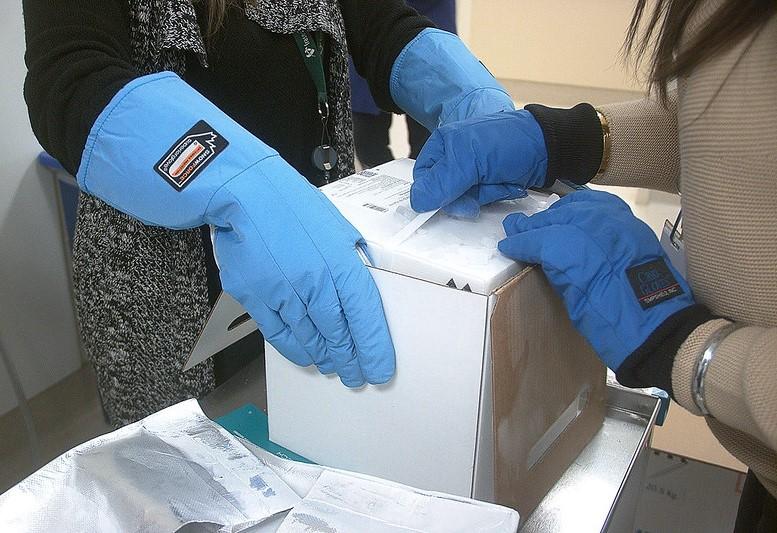Shipments of the newly authorized Moderna vaccine arrived in states today, launching immunization with a second vaccine, as the United States' COVID-19 total approached 18 million cases.
Federal health officials over the past few days green-lighted the vaccine for emergency use, which vastly expands the reach of COVID-19 vaccines to more than 4,000 sites and comes as the pace of holiday travel picks up, a factor likely to push US case numbers higher in the weeks ahead.
Vaccine distribution expands reach
At a Health and Human Services (HHS) briefing today on Operation Warp Speed (OWS), Gen. Gustave Perna, OWS' chief operating officer, said today and tomorrow a total of 5.9 million doses of Moderna's vaccine will arrive at 3,400 locations, and 2.1 million more doses of the Pfizer-BioNTech vaccine will arrive at about 1,000 locations.
HHS Secretary Alex Azar said the Moderna vaccine will be available in more locations than the Pfizer-BioNTech vaccine, because it doesn't require super-cold freezer storage.
At a Dec 19 briefing, Perna addressed reports of second shipments last week catching several governors by surprise and said that the issue was that not all doses that state officials had been told they would receive for planning purposes were releasable under Food and Drug Administration standards; as a result, the allocated doses were lower than the initial projections.
While Perna did not fully explain what has to occur before vaccine doses are considered releasable, he said that no vaccine doses had been cut and apologized to state officials for the confusion. "I want to take personal responsibility for the miscommunication," Perna said. "I will work hard to correct this, and we have done several things to do this right."
Perna said that the government is still on track to allocate 20 million vaccine doses to all jurisdictions by the end of the month.
Today, he said OWS and states are getting into a regular cadence of distribution.
In other OWS developments, Moncef Slaoui, PhD, its chief scientific officer, gave updates on the next two vaccines likely to seek emergency use authorization (EUA). He said the Johnson & Johnson vaccine, which requires only one dose, closed its phase 3 study enrollment with more than 43,000 participants, with an interim analysis expected in early January. Meanwhile, enrollment in the AstraZeneca phase 3 trial is nearing its 30,000-participant enrollment goal, with an analysis expected soon. Last week, he said the companies might be able to apply for an EUA by February.
Regarding reports of a small number of allergic reactions following vaccination with the Pfizer-BioNTech COVID-19 vaccine, Slaoui said the National Institutes of Health is planning a study in highly allergic people to better understand the immune mechanism that might be contributing to reactions to help predict and manage the events.
In other vaccine developments, President-elect Joe Biden today received the vaccine on live TV at a hospital in his home state of Delaware in an effort to reassure Americans about the vaccine, according to CNBC. His wife, Jill Biden, was at his side and was immunized earlier in the day.
The National Institutes of Health (NIH) said today that Tony Fauci, MD, director of the National Institute of Allergy and Infectious Diseases (NIAID); NIH Director Francis Collins, MD, PhD; and HHS Secretary Alex Azar will be vaccinated with Moderna's vaccine at a kickoff event tomorrow to boost confidence in the vaccine. NIAID scientists worked with Moderna to develop the vaccine, which received support from OWS.
US holiday travel builds as cases near 18 million
Despite repeated pleas of public health officials for people to stay home over the holidays and avoid travel, Transportation Security Administration data show that more than 2 million people have passed through security checkpoints over the last 2 days, according to NPR. Travel volume is down 60% from last year but is still much higher than in earlier pandemic months.
The United States has averaged 215,600 cases and 2,600 deaths a day over the past week, according to a CNBC analysis of Johns Hopkins data. And today, the total neared 18 million cases, climbing to 17,959,886 cases, along with 318,782 deaths, according to the Johns Hopkins tracker.
As US cases remained high in the lead-up to Christmas, the situation at California's hospitals became more dire. As of Dec 19, nearly 17,400 people were hospitalized with COVID-19, more than twice the July peak, according to NBC Los Angeles. And in Tennessee, Gov. Bill Lee this weekend signed an executive order that limits public gatherings to 10 people but doesn't include a statewide mask mandate, according to The Hill.
In other US developments:
- Lawmakers last night reached a deal on a $900 billion coronavirus stimulus package that would provide $600 stimulus checks to adults earning up to $75,000, $300 in weekly unemployment benefits, and billions for testing, tracking, and vaccine distribution, according to the New York Times.
- The United States isn't currently planning on banning travel from Britain due to the emergence of a SARS-CoV-2 variant spreading rapidly in the country's southeast, HHS Assistant Secretary Adm. Brett Giroir told CNN today. He said federal officials are in contact with the Centers for Disease Control and Prevention (CDC) and that so far there's no travel ban recommendation. Meanwhile, researchers at Walter Reed Army Institute of Research said they began examining genetic sequences of the UK variant on Dec 17 that were posted online and that they will know in the next few days if there are any problems with vaccine protection, according to CNN.


















